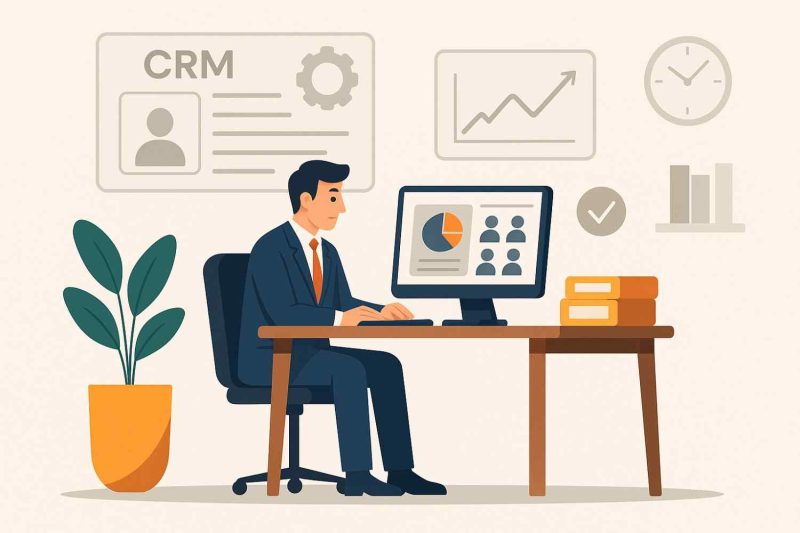If you’re still running your business without a CRM system, you’re basically playing hide-and-seek with your customers and spoiler alert, you’re the one who keeps getting lost. Customers today expect more than just quick transactions; they expect personalization, consistency, and yes, even that occasional “We remembered your dog’s birthday” email. In the beginning, sticky notes and Excel sheets may have been enough, but as your business grows, so does the chaos. That’s where a CRM system for your business becomes a lifesaver. It’s not a luxury—it’s a necessity that centralizes data, organizes follow-ups, and keeps your team focused instead of frantic.
What Exactly Is a CRM System?
CRM (Customer Relationship Management) system is a digital Swiss Army knife for businesses—it keeps your sales, marketing, and support teams in sync. But it’s not just fancy software”; it’s the difference between losing a deal because you forgot to call and closing it because you got a nudge at the perfect time. Think of it as a smart assistant who remembers everything (without needing coffee). A CRM system for your business doesn’t just store names and numbers—it tracks conversations, preferences, and history, creating a 360-degree view of your customer relationships that spreadsheets could only dream of.
The Core Benefits of a CRM System for Your Business
Let’s face it: juggling customers, leads, and tasks without a CRM feels like herding cats in a thunderstorm. A CRM system for your business brings order to chaos. First, it centralizes all customer data—no more frantic searches through inboxes or WhatsApp threads. Second, it keeps your sales pipeline flowing, showing exactly where each lead stands. Third, it automates those soul-crushing repetitive tasks (because no one dreams of manually logging follow-ups). Finally, it improves team collaboration by ensuring everyone’s on the same page. In short, a CRM isn’t just about efficiency—it’s about making sure your team can focus on growth, not firefighting.
How CRM Powers Growth (Revenue, Retention, and Reputation
Growth doesn’t happen by accident; it’s engineered. A CRM system for your business acts like the blueprint. It drives revenue by streamlining lead nurturing, ensures retention with personalized follow-ups, and polishes your reputation through consistent customer engagement. Imagine sending the right offer at the right time—because your CRM flagged it, not because your salesperson had divine intuition. The result? Customers feel valued, not marketed to. We’ve even seen businesses double client retention simply by using automated reminders. and let’s not forget reputation: nothing says “professional” like remembering details your competitors forgot. With a CRM, growth isn’t just possible—it’s predictable.
Signs Your Business Desperately Needs a CRM
There are telltale signs when it’s time to bring in a CRM system for your business. If you’re still managing customers in Excel sheets—or worse, in your head—you’re one missed follow-up away from disaster. When your team constantly asks, “Who’s handling this lead?” it’s a red flag. If customers complain about repeating their story every time they call, your system is broken. And when deals slip through the cracks because Monday mornings are chaos, you need help. A CRM eliminates these headaches by ensuring tasks, notes, and follow-ups don’t vanish into the void. Basically, if confusion reigns, CRM is king.
CRM Systems Aren’t Just for Big Enterprises
Here’s a myth worth busting: CRM systems are only for Fortune 500 giants. Wrong. In fact, small and medium businesses often benefit the most from a CRM system for your business. Why? Because every customer counts, and losing even one can sting. Modern cloud-based CRMs are affordable, scalable, and user-friendly—you don’t need an army of IT staff to use them. Think of it this way: if you can afford coffee for your team each morning, you can afford a CRM. And unlike coffee, the boost doesn’t wear off after an hour. A CRM keeps delivering value, day after day.
Choosing the Right CRM System for Your Business
Not all CRMs are created equal, and picking one is a bit like choosing shoes—you need the right fit, not just the fanciest label. The right CRM system for your business should be scalable (so it grows with you), integrate seamlessly with tools you already use, and be intuitive enough that your team doesn’t secretly curse it. Bonus points for solid support and customization options. For businesses in the USA, UK, Israel, Switzerland, or UAE, compliance and data security are crucial too. And here’s a tip: the “best” CRM isn’t necessarily the most expensive one—it’s the one your team actually uses.
Implementing a CRM Without Losing Your Sanity
Rolling out a new CRM system for your business doesn’t have to feel like organizing a family reunion—chaotic and filled with resistance. Start small with a phased rollout, introducing the most essential features first. Train your team properly (because untrained users are the fastest way to sabotage adoption). Set clear goals: do you want to improve follow-ups, boost sales, or simply reduce chaos? And remember, not every feature needs to be activated on day one—launching all 200 at once is a recipe for meltdowns. With the right strategy, implementation can feel less like an uphill battle and more like progress.
The Future of CRM: AI, Automation, and Beyond
The future of a CRM system for your business isn’t just about managing contacts—it’s about predicting needs before customers even speak. Artificial intelligence is already transforming CRMs with predictive analytics that can forecast churn, spot opportunities, and suggest next best actions. Automation will continue to shave hours off repetitive tasks, while AI-powered chatbots integrate seamlessly for real-time customer support. Mobile-first designs ensure teams can manage pipelines from anywhere (even at the airport). At Kanhasoft, we’re building AI-driven CRM systems that go beyond tracking data—they deliver insights. The next wave of CRM isn’t reactive; it’s proactive, predictive, and downright powerful.
Conclusion:
Here’s the truth: waiting to adopt a CRM system for your business is like ignoring a leaky roof—it only gets worse (and more expensive). Every day without a CRM means missed follow-ups, forgotten customers, and lost opportunities. Businesses that thrive don’t leave growth to chance; they build it into their systems. A CRM doesn’t just manage customer data—it manages your sanity, keeps your team aligned, and ensures no client feels forgotten. In the end, investing in a CRM isn’t just smart—it’s survival. Because in today’s market, those who wait are the ones left scrambling, while those with CRMs are scaling.



